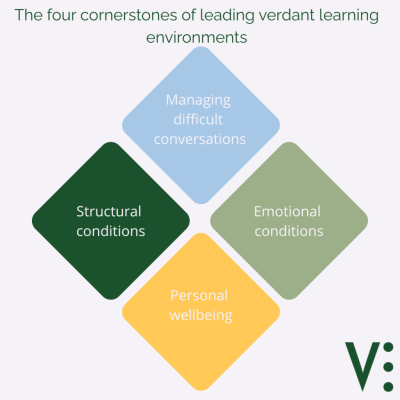The four cornerstones of leading verdant learning environments
In a one-to-one leadership coaching collaboration, we start by defining an overarching goal and focus every session on a strategically important topic that deserves clarity and change in order for you to achieve the goal. The International Coaching Federation describes coaching as “partnering with clients in a thought-provoking and creative process that inspires them to maximise their personal and professional potential.” In this creative partnership, I support you in becoming clear with what you want, what you need to get there and then to get it done. That means, there is no fixed curriculum.
On the contrary, the power of coaching builds on the trust that you have the answers to your questions and challenges within yourself already, and that the coaching process will help you uncover them. My approach to coaching is catalytic, i.e. the focus is on moving into action through testing new ideas and behaviours in practice and learning along the way. You will continually put the answers you uncover during coaching sessions to the test in your context, and refine and develop them as a result.
Having said that, there are certain topics that will almost certainly arise for any school leader in the coaching process. I call them the four cornerstones of leading learning environments: (1) personal wellbeing, (2) emotional and (3) structural conditions for leading & learning and (4) managing difficult conversations. Depending on your goals, any of them will take more or less space in the coaching collaboration.
- Personal wellbeing. In any organisation, leaders are role models and shape organisational culture more than other members. In schools, modelling the culture you want your pupils to experience is particularly important. That is why, we will make sure that you show up as the leader you want to be. That might include learning to steer your energy, not your time. I might help you define how you want to take care of yourself and how you might be able to create regular space and time for exercise, healthy food, sleep and relationships. Every session will invite you to verbalise your current priorities and outline clear next steps for yourself, and thereby help you identify what you will not do. Leading others always starts with leading yourself and taking responsibility for your own wellbeing.
- Emotional conditions for leading & learning. Leadership in schools, as in other organisations, is a function of cultivating resilient relationships. During our coaching sessions, you practise shifting perspectives to better understand others’ and your own needs. We might explore how different actions or behaviours might be perceived by colleagues, staff and pupils. We might focus on understanding how you can improve your relationship with key staff or key pupils, or how you can ensure that already strong relationships stay strong or become stronger. We might explore how you want others to feel before, during and after a meeting or conversation with you, and what you can do to create the right conditions for collaboration and trust.
- Structural conditions for leading & learning. These are all habits and practices that create desired results over time in your school. Leadership in schools means using pupils’ and teachers’, and all other staff’s, time wisely, i.e. in the best interest of pupil outcomes. We might look at how you plan your week and steer your time. We might reflect more deeply on meeting structures, or other school routines. We might even discuss potential changes to physical structures in your school in order to create a space more conducive to the culture and results you want to create. Anything we do often, creates results. That is why it is important to check that your habits are aligned with your goals. We will make sure that you create daily and weekly habits that contribute to the overarching goals of your school.
- Managing difficult conversations: Last but not least, leadership is about holding space for constructive conflict and harmony. There can be no harmony without the ability to go through conflict constructively. Topics will come up for you where you will need to define your needs and boundaries clearly, and practice communicating them kindly and assertively. You will learn to experience clarity and honesty as kindness, towards yourself and others. You will also think about the system, i.e. all people, involved in a conflict or a difficult conversation and create clarity about how you need and want to show up for each of them in order to support their personal development and growth through the situation.
All four cornerstones might come up for you when working to develop your leadership and achieve your goals through coaching, but not all necessarily will. Each coaching collaboration is unique, because you are unique as an individual and as a leader. When I coach you, we will draw on your expertise of yourself and your environment to come up with new creative solutions to create the outcomes you desire. To learn more about what that process will look like for your goals and challenges, book your free-of-charge consultation with me now.


